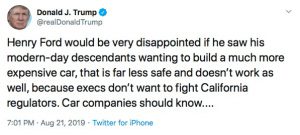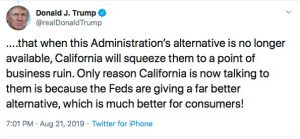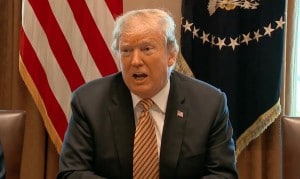Once again, Ford Motor Co. is finding itself in the crosshairs as President Donald Trump launches a new Twitter assault on the Detroit automaker.
During his campaign for the White House, Trump hammered Ford repeatedly over Mexican production plans. This time, however, his Twitter feed focuses on Ford’s decision to join three rival carmakers in a deal with California regulators that will have them essentially ignoring the administration’s planned rollback of the Corporate Average Fuel Economy, or CAFE, standards.
In a tweet, Trump evoked the memory of Ford Motor Co. founder Henry Ford, claiming he would be “very disappointed if he saw his modern-day descendants wanting to build a much more expensive car, that is far less safe and doesn’t work as well, because execs don’t want to fight California regulators.”
(Trump Chides Automakers for Making a Deal With California)
There’s no question that automakers prefer to work with the State of California, the single largest automotive market in the U.S., but there’s not much else accurate in the president’s tweet, it turns out.
The reference to vehicle safety echoes comments made during a media presentation last year of a preliminary draft of the administration’s planned rollback of the CAFE standards. Officials from the Environmental Protection Agency and the National Highway Traffic Safety Administration, which jointly regulate U.S. fuel economy standards, claimed the Obama-era 54.5 mile per gallon target set for 2025 would result in more highway deaths by lowering the cost of fuel and thus encouraging Americans to drive more.
 That was widely and roundly rejected, even by the EPA itself, as were most of the other arguments that are now expected to see the administration’s final proposal freeze fuel economy numbers at 2021 model-year levels, or about 37 mpg.
That was widely and roundly rejected, even by the EPA itself, as were most of the other arguments that are now expected to see the administration’s final proposal freeze fuel economy numbers at 2021 model-year levels, or about 37 mpg.
While Ford and other automakers had been hoping to see a slight rollback of CAFE, they have not supported the administration’s more drastic reductions. If anything, some automakers are now taking steps that would require them to deliver much better mileage.
The agreement California regulators reached with Ford, Honda, BMW and Volkswagen are looser than those currently in place but stricter than what the current White House plan calls for. And, significantly, they would continue moving forward on plans to bring large numbers of battery cars to market to meet California’s zero-emissions vehicle, or ZEV, mandate.
Ford, for one, has committed more than $11 billion to the development of battery-based cars and recently announced a deal to share an all-electric platform developed by erstwhile rival Volkswagen. VW, for its part, plans to have about 50 different battery-cars in production in various parts of the while by the middle of the coming decade.
Trump’s reference to the higher price of battery cars is correct for now, with battery-based vehicles typically costing thousands more than comparable gasoline-powered models. But even that is expected to become a moot point in the relatively near future. Mark Reuss, the president of General Motors – which did not join in on the California deal – recently predicted that costs will reach parity in the near future, perhaps before mid-decade. And that doesn’t factor in possible federal and state incentives or the lower cost of energy for a battery vehicle.
(Four Automakers Sidestep Trump, Make Fuel Economy Deal with CARB)
For its part, Ford defended its decision to reach a deal with California, noting, “This agreement … provides regulatory stability while reducing carbon dioxide more than complying with two different standards.”
Automakers have to plan their product and manufacturing strategies years in advance, so stability is a key issue, Joe Hinrichs, Ford’s president of automotive operations, told NBCNews last month. Automakers collectively worry that any cuts to fuel economy standards announced by the Trump Administration would be quickly tied up in court and could be abandoned entirely should the president lose his re-election bid next year. If so, they could wind up having to reverse course once again.
California isn’t the only state that has tried to reach a deal with the auto industry. Late last month Colorado reached a deal with key manufacturers that will see the state adopt California’s zero-emission vehicle rules.
Ford isn’t the only one firing back at the White House. Critics said there is no evidence to support the president’s claim that more fuel-efficient cars won’t “work as well.”
Separately, California Attorney General Xavier Becerra dismissed the proposed CAFE rollback, saying, “This doesn’t look like a better alternative to us.”
Several industry observers questioned why Trump singled out Ford for attack in his tweet about CAFE. But the automaker has been a long-standing target for the president, starting while he was Candidate Trump. The former New York businessman repeatedly criticized Ford’s plans to to end production of several passenger car models, including the Focus sedan, in Michigan and move it to Mexico. The automaker subsequently announced it would not only scrub plans for a second Mexican plant but kill off the Focus and most other passenger car models entirely to focus on hot-selling SUVs.
Ironically, Ford produced 2.3 million vehicles in the United States in 2018, 230,000 more than any other auto manufacturer, and about 80% of the vehicles it sold in the country. The factory that produced the slow-selling Focus has now been converted to build several light truck models, including the Ranger pickup, and is expected to see a boost in output when they are all online.
(Colorado Next State to Bypass Trump and Make Deal with Automakers)
“Instead of being the whipping boy, Ford should be Trump’s poster child” for U.S. manufacturing, suggested a source close to Ford.

